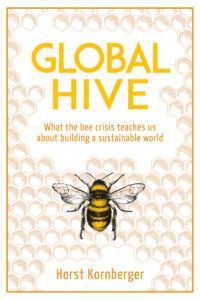Global Hive: What The Bee Crisis Teaches Us About Building a Sustainable World
by Floris Books • 2 July 2019 • Extract, Philosophy of the Natural World • 0 Comments
In Global Hive Horst Kornberger explores the lack of joined-up thinking in our society through the lens of the bee crisis, and encourages us to think about how, through our own choices, we can build a more sustainable world.
Here, we share an extract from the book in which Kornberger begins his rallying cry for a new understanding of world ecology.
We are becoming used to environmental disasters. The bee crisis, however, strikes a singular chord. Everyone is alarmed because everyone is affected. One third of the world’s food production depends on bees. The potential loss of pollinating hives is a clarion call even to environmental skeptics, the loss of biodiversity a frightful prospect to those with ecological concerns. A growing world population and a declining number of bees is a dangerous mismatch.

The first signs of colony collapse surfaced in Texas and Louisiana in 1960. From 1972 feral bee populations began to fall in the United States and are now almost extinct. Trachea and Varroa mites started to wreak havoc in colonies in the 1980s. France reported major unexplained losses of bee populations in 1992. By 2005 fifty per cent of domesticated bees had perished in the US. The United Kingdom became affected in 2006. In the same year the term Colony Collapse Disorder was coined to describe what was rapidly becoming an agricultural catastrophe. Two years later many US beekeepers reported losses of up to ninety per cent. Belgium, the Netherlands, France, Greece, Italy, Portugal and Spain suffered substantial declines, and other European countries soon followed. In the meantime, severe colony collapse has struck China and Japan. Egypt is also affected.

Beekeepers are at a loss as to how to stem the tide of destruction. Scientists have begun a frantic search for causes. Many accuse the Varroa mite, but this mite coexisted with Asian bees long before colonies began to collapse. Other researchers blame monoculture, genetically modified crops, herbicides, pesticides and electro-smog. No doubt these all play their ignominious part. But bees are dying in areas unaffected by herbicides. Colonies collapse where there is little electro-smog.

In this book I explore the reasons behind the bee crisis and suggest a new way of thinking about it. My aim is not to discredit current trends of thought but to establish communication between different ways of seeing the world. I believe that the gap that separates these ways of seeing is the same into which species after species disappear.
About the author
Horst Kornberger was born in Austria in 1959. He is a poet, artist, writer and lecturer. He has taught at the Rudolf Steiner College in California and now lives in Western Australia. He is the founder of the School of Integral Art where he pioneers creative, biographical and story writing. He is the author of The Power of Stories: Nurturing Children’s Imagination and Consciousness.


